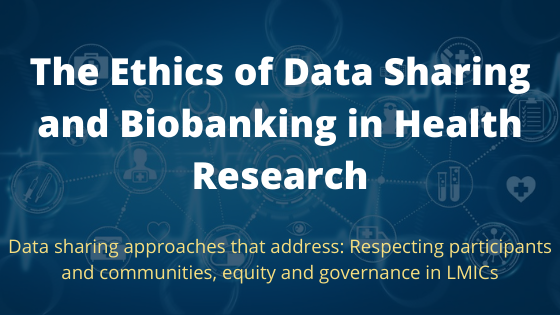The importance of data sharing and biobanking has been accepted by researchers worldwide. Data sharing promotes research by making the biospecimens and their associated data easily accessible to researchers.
But it also raises some ethical challenges. These issues were addressed in an annual meet of ‘Global Forum on Bioethics in Research (GFBR)’ in 2018 at Stellenbosch, South Africa.
What is GFBR?
The GFBR is an informal partnership established by several organizations with a shared interest in the ethics of conducting research involving people in low- and middle-income countries (LMICs). They convene meetings approximately annually, emphasizing hearing the views and experiences of a wide range of stakeholders and the development of new networks and relationships.
In the 2018 annual meet of GFBR, about 95% of participants from 35 countries discussed their case studies and experiences on issues related to:
- Respect for study participants and communities
- Promotion of equitable sharing, and
- International and national approaches to govern data sharing and biobanking
Respecting participants and communities
Protection of participants’ confidentiality and privacy is a foundational requirement in biomedical research. Additional key considerations include:
- Appropriate models of seeking consent to sharing
- Meaningful engagement with participants and communities
- Evaluating approaches to benefit-sharing
While evaluating the different consenting and data sharing models, the GFBR participants stated that it is essential to verify if they are contextually sensitive and appropriate.
E.g., Broad consents were thought to be better consenting models for biobanks; however, it is essential to evaluate if it could lead to potential misuse of biospecimens.
The participants also discussed the importance of implementing practical approaches to community and public engagement around data sharing and biobanking. The discussion included constraints in data collection due to cultural beliefs. It was agreed that the benefit of research should be communicated to the research participants and their relevant communities.
Equity
The sharing of biospecimen and related data takes palace in a heterogeneous community of stakeholders. They have differing interests, remits, values, authority, and access to resources. The international mandates for data sharing are insufficient for LMIC countries. While wealthy institutions can make good use of data coming from LMICs, the reverse is not true. Efforts should be made to reduce these inequalities.
To make the data sharing approaches more effective, it is crucial to address the priority areas such as:
- Considering equity while development, review, and implementation of data sharing approaches
- Recognizing all intellectual contributions while developing processes
- Alignment of academic recognition and promotion with data sharing mandates
- Investment in the human resources, infrastructure, and collaborative relationships required to enhance efficient data curation and secondary data analysis capacity in LMIC settings
- Investment in sustainable and inclusive platforms for complex data integration and analysis, particularly for priority health areas in LMICs
- Capacity-building approaches which support effective and contextually sensitive review and governance of data-sharing and biobanking activities
Governance
Good governance is essential for building trust in biomedical research. Currently, many LMIC countries have limited regulatory and governance structures for biobanking and data sharing. The participants at the GFBR meeting highlighted the importance of developing approaches to govern data sharing and biobanking. It should be ensured that the interests of study participants and communities, data providers and data users, and the public are appropriately recognized and respected.
There are several challenges which LMICs face while data sharing, including but not limited to – lack of a legal framework and regulations, monitoring and enforcement, conflict of interest, exploitation, the remit of research ethics committees, maintenance of biobanks, technical abilities to govern, lack of data expertise, long-term storage of personal health information and samples, etc.
These challenges can be overcome if critical elements of governance are in place, which are as follows:
- Harmonization of governance guidelines: Need for ongoing collaboration between participants and key stakeholders so that ethical codes for data sharing are not breached.
- Transparency and accountability: Between participants and stakeholders.
- Community engagement/involvement: This is important, especially in LMICs, since in some LMIC contexts, individuals often make decisions in consultation with family and community members.
- Non-exploitation: Benefit-sharing should be equal.
- Rational compliance: Policies and legal requirements should facilitate research, not impose unnecessary obligations.
- Conflict of interest: Limited access to specimens should not hinder research.
- Flexibility: Governance mechanisms should accommodate advances in research and development.
- External review: Regular reviews by independent bodies to ensure data sharing is done responsibly.
Conclusion
Effective sharing of biospecimens and related data requires a significant investment to develop and maintain curation standards, methods, and infrastructure, in addition to appropriate governance policies and processes. It is essential to establish approaches that focus on maximizing utility and recognize the varying priorities and values of a range of stakeholders, including study participants, researchers, communities, and the broader public.

